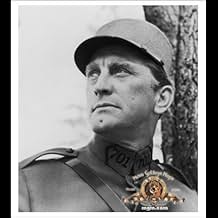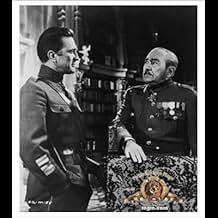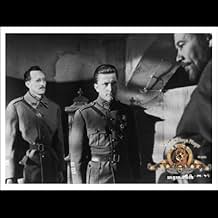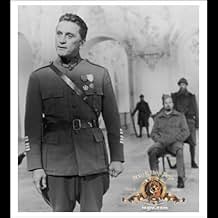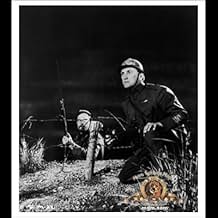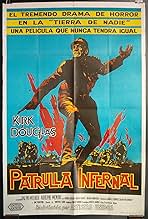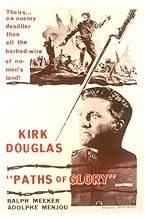Après avoir refusé d'attaquer où l'ennemi était ammassée, un général accuse les soldats de lâcheté et leur officier commandant doit leur défendre.Après avoir refusé d'attaquer où l'ennemi était ammassée, un général accuse les soldats de lâcheté et leur officier commandant doit leur défendre.Après avoir refusé d'attaquer où l'ennemi était ammassée, un général accuse les soldats de lâcheté et leur officier commandant doit leur défendre.
- Réalisation
- Scénario
- Casting principal
- Nomination aux 1 BAFTA Award
- 5 victoires et 3 nominations au total
- Pvt. Pierre Arnaud
- (as Joseph Turkel)
- German Singer
- (as Susanne Christian)
- Capt. Sancy
- (non crédité)
Résumé
Avis à la une
The setting is the Western Front of 1916 in the trenches with French soldiers faced off against an invisible German force across a barren No Man's Land. The German's are never seen and the dramatic "combat" is between vain French officers as they vie for prestige and honors. The victims are the innocent French soldiers under their command who suffer miserably because of their arrogance and ignorance.
Brilliant, gripping, and definitely a "must see".
Now, fifty years later, the film is still timely, having lost none of its power to illuminate. Thanks be to Kirk Douglas for taking a chance on an unproven Stanley Kubrick and getting Allied Artists to finance what was so clearly a non-commercial project. I suspect too, that it was at AA's insistence that Hollywood veterans be cast, even though the movie was shot to great advantage amidst the majestic settings of old Europe. Given the film's message, I think Kubrick would have preferred no-name principals, but then, who could have surpassed the oily charm of Adolphe Menjou's diabolical general, or the pathetic repulsiveness of Timothy Carey's sacrificial dog-face. (It's ironic that the part of the cowardly lieutenant went to an authentic war-hero, naval air-ace Wayne Morris, then only two years away from an untimely death.) This many decades later, I still have mixed feelings about the celebrated final scene. On one hand, it's so clearly manipulative (someone once called it a "male weepie"), that I try to steel myself against its undeniable force; on the other, it's so superbly well done that the humming chorus of universal brotherhood never fails to move me, even after this many viewings.
Researchers digging into origins of 60's counter-culture should check out themes and characterizations of the screen-play, particularly Timothy Carey's social outcast and Fred Bell's absolutely stunning thirty seconds of emotional break-down. For this is one of the few films from the conformist Eisenhower era to cast a shadow forward in time and serve as a reference point for future generations. The film's abundant cynicism may no longer be as revealing as it once was, thanks to Vietnam. Yet the emotional honesty remains as fresh and compelling as ever in its search for a gut-level depiction of real human anguish. Above all, Kubrick's anti-war classic points toward a more civilized potential amidst the barbarities and passions of combat, whether French or American, and given present political realities, still has many lessons to offer.
This is a thought-provoking and intelligent war drama perfectly acted by strong cast and masterfully directed. Interesting screenplay based on a Humphrey's Cobb's novel has been well adapted by Stanley Kubrick and Jim Thompson . It depicts a brooding study about futility and insanity of war , making a shattering accusation against the military ruling staff who cares on promotions more than the soldiers . Kirk Douglas is very good as compassionate French Colonel who commands his troops in some spectacular scenes on the trenches . Stunning support cast beautifully performed by notorious secondaries , such as : Emily Meyer as the priest , Wayne Morris as the lieutenant , Richard Anderson as the Major prosecutor , Ralph Meeker , Timothy Carey , Joe Turkel and Suzanne Christian , Kubrick's wife . Special mention for the two selfish and ruthless Generals exceptionally performed by George Macready and Adolph Menjou . Excellent cinematography in black and white by cameramn George Krause , filmed on location in Schleissheim Palace, Munich, and Bavaria Film studios, Geiselgasteig, Grünwald, Bavaria, Germany (studio). The motion picture was wonderfully realized by the maestro Stanley Kubrick and lavishly produced by James B. Harris , his usual producer at the time . This magnificent film along with ¨ All quiet on the Western front ¨ , ¨Westfront 1918 ¨, ¨ Captain Conan ¨ and ¨King and country¨ result to be the best ones about the powerful antiwar theme . Time hasn't dimmed its power , or its poignancy and remains untouchable the critique to the military hypocrisy in an ultra-lucid exposition . Rating : 8.8/10. Phenomenal and marvellous film , above average . Essential and indispensable watching .
Winston Churchill famously claimed that it was this movie that was closest to evoking the atmosphere of WW1 and the military mind. And you know what, he is right. For one thing, Paths of Glory is gorgeously filmed, with relentlessly beautiful cinematography and nice costumes and scenery. The screenplay is sometimes humorous, sometimes moving and sometimes even haunting, either way it was some fine writing. The efficiency of Kubrick's direction is proof of a great man at work.
The performances were superb. As the general who orders the hopeless attack on the German position, Adolphe Menjou's character is perceived as a villain not because of being an officer adhering to the letter, but that he is seen as "the arrogant aristocrat" because of his fear of the working classes than his hatred of the enemy. Among the cast, Timothy Carey and Kirk Douglas especially were outstanding. And the music? That is one rousing score I can tell you. Great movie. 10/10 Bethany Cox
Le saviez-vous
- AnecdotesBanned in Spain under Gen. Francisco Franco's dictatorship for its anti-military message. It wasn't released until 1986, 11 years after Franco's death.
- GaffesCol. Dax commits a glaring military faux pas by jamming his hands into his pants pockets while standing and walking in the courtroom during the trial. No military officer would do such a thing, particularly in such a formal setting as a court martial.
- Citations
Pvt. Pierre Arnaud: I'm not afraid of dying tomorrow, only of getting killed.
soldier in bunk: That's as clear as mud.
Pvt. Pierre Arnaud: Well, which would you rather be done in by: a bayonet or a machine gun?
soldier in bunk: Oh, a machine gun, naturally.
Pvt. Pierre Arnaud: Naturally, that's just my point. They're both pieces of steel ripping into your guts, only the machine gun is quicker, cleaner, and less painful, isn't it?
soldier in bunk: Yeah, but what does that prove?
Pvt. Pierre Arnaud: That proves that most of us are more afraid of getting hurt than of getting killed. Look at Bernard. He panics when it comes to gas. Gas doesn't bother me a bit. He's seen photos of gas cases. Doesn't mean anything to me. But I'll tell you something though, I'd hate like the devil to be without my tin hat. But on the other hand I don't mind not having a tin hat for my tail. Why is that?
soldier in bunk: You're darn tootin', because...
Pvt. Pierre Arnaud: Because I know a wound to the head would hurt much more than one to the tail. The tail is just meat but the head- ah, the head is all bone.
soldier in bunk: That's...
Pvt. Pierre Arnaud: Tell me this. Aside from the bayonet, what are you most afraid of?
soldier in bunk: High explosives.
Pvt. Pierre Arnaud: Exactly, and it's the same with me, because, because I know that it can chew you up worse than anything else. Look, just like I'm trying to tell you, if you're really afraid of dying you'd be living in a funk all the rest of your life because you know you've got to go someday, anyday. And besides...
soldier in bunk: Yes?
Pvt. Pierre Arnaud: If it's death that you're really afraid of why should you care about what it is that kills you?
soldier in bunk: Oh, you're too smart for me, Professor. All I know is, nobody wants to die.
- Versions alternativesThe Criterion DVD version features the opening and closing MGM logos.
- ConnexionsEdited into Hai-Kubrick (1999)
- Bandes originalesLa Marseillaise
(1792) (uncredited)
Written by Claude Joseph Rouget de Lisle
In the score during the opening credits
Meilleurs choix
Everything New on Prime Video in July
Everything New on Prime Video in July
- How long is Paths of Glory?Alimenté par Alexa
Détails
- Date de sortie
- Pays d’origine
- Langues
- Aussi connu sous le nom de
- Patrulla infernal
- Lieux de tournage
- Schloß Schleißheim, Oberschleißheim, Bavaria, Allemagne(Command Headquarter)
- Société de production
- Voir plus de crédits d'entreprise sur IMDbPro
Box-office
- Budget
- 935 000 $US (estimé)
- Montant brut mondial
- 8 290 $US
- Durée1 heure 28 minutes
- Couleur
- Mixage
- Rapport de forme
- 1.66 : 1
Contribuer à cette page







